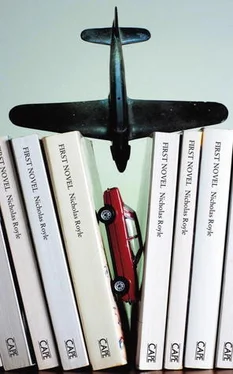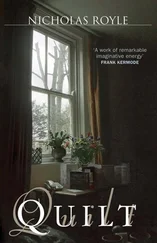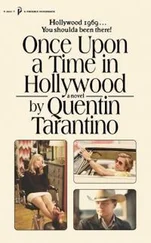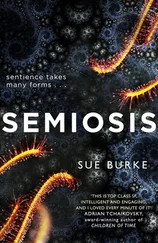Ray took a step closer and saw that she was holding a shell in the palm of her hand. It was a conch or a whelk — Ray was no expert — in perfect condition about three or four inches long.
‘May I?’ Ray said.
‘Please do.’
He took the shell and brought it up to his nose. It smelt only faintly of the sea. He held it up to his ear and gave his head a little shake, trying out a small, friendly smile.
June Flynn smiled too.
‘It was among his things,’ she said. ‘His personal effects. There wasn’t much, but there was this, and there was a diary, which I’m ashamed to say I read from cover to cover. I don’t think it contains anything he would not have wanted his mother to read.’
‘I’m sure,’ Ray said.
‘He wrote in his diary that you gave him the shell and that he liked you. It seems you looked out for him.’
Now Ray remembered picking the shell up off the beach and handing it to Flynn. He felt a sudden tightness at the back of his throat.
‘Thank you,’ he said. ‘Do you mind if we sit down again?’
‘Of course. Sorry.’
‘But I can’t accept this,’ Ray said, offering the shell back.
‘I would like you to. I have his diary. When I reread it, as I will many times, I’m sure, it will remind me of the shell and it will make me happy to think that you have it.’
‘If you’re sure?’
‘I’m sure.’
There was another silence, more comfortable this time.
‘I should go, June. You’ve been very kind letting me come to see you. And thank you for the shell.’
‘I’m very grateful to you for coming,’ she said.
They both stood up.
‘I’m sorry about my husband,’ she said. ‘He finds it very hard.’
‘I understand.’
She showed him into the hall and opened the front door.
‘Thanks again, Ray.’
‘Thank you, June.’
They shook hands and he stepped on to the drive, hearing the door shut behind him. As he drew level with the front bumper of the Morris Minor, he turned and looked at the house. A movement caught his eye. The bedroom window. The corner of a lace curtain.
At the end of Granada Place he turned right instead of left and found his way, via a small sheltered car parking area clearly intended for local residents, on to the field at the side of the Flynns’ house. He walked across it towards the stream — Briar Dene, June Flynn had called it — at the far side. A path led down through a copse. He imagined the younger Russell Flynn playing here. An only child, he would have relied on his imagination, playing one-sided games involving battles with various different enemies, making bivouacs and secret hiding places for sacred artefacts.
Ray thought about Russell Flynn’s father sitting in his bedroom throughout Ray’s visit. Either his own bedroom, or possibly his son’s. Maybe he had been too upset by the official visit from the RAF to be able to stomach another one, albeit unofficial? Maybe he blamed Ray for his son’s death, since it was known that Ray had been a passenger on board the Hercules at the time of the accident?
Ray climbed out of the shallow gully and looked back across the field towards the house at the end of Granada Place. He hoped that, whatever the reason had been for the boy’s father’s reluctance to come downstairs, he and his wife were now sharing each other’s company rather than remaining isolated in their own private grief.
He proceeded down to the road and crossed it to get to the links. Then he walked the short distance over the links to the beach. He took off his shoes and socks and rolled up his trousers and walked on to the sand. A cold wind blew in off the sea. To the left was a lighthouse that could be reached by means of a causeway, which looked as if it would be inaccessible at high tide. To the right, a few miles to the south, lay the mouth of the Tyne. He kept on walking until he felt damp sand beneath his feet. Zanzibar had been somewhat warmer and arguably more beautiful than this, but he knew he had done the right thing by coming back. The sea, when he eventually felt wavelets washing over his bare feet, was icy cold. He put his hands in his pockets and found the shell that June Flynn had given him. He closed his fingers around it.
Life was short and unpredictable and Ray decided he would not spend a single second of it living in regret.

The house possesses a particular stillness. It is the stillness of a house you are not supposed to have entered. I think back to the time when Lewis mentioned that he habitually leaves certain doors unlocked and wonder if his mentioning it was deliberate. Did he want me to pick up on the line; did he want me to remember it? Or was he simply boasting that life here is like that? You can leave your door open without worry — who is going to come in? Or was he suggesting that he has nothing worth stealing? Since he has already lost what was dearest to him, what would it matter if burglars nicked his TV, his DVD player, his collection of Smiths albums? Actually, with regard to the latter, I might suggest they would be doing him a favour, although, as I’m always having to remind my students, since my opinion of the Smiths is irrelevant here, I have no business including it. It doesn’t buy its way into the piece.
Although maybe it demonstrates character, my not liking the Smiths? Perhaps it’s designed to show that I’m an outsider, a Mancunian in his forties who doesn’t like the Smiths.
I close the connecting door to the garage quietly behind me.
There is a low hum from the fridge, a dripping tap. Beyond these noises lie the stillness of empty rooms, the tension of untrodden stairs. I move out of the kitchen into the hall. At the other end of the hall is the front door. I am about to cross the hall to reach the living room when I hear the clatter of the gate and then through the stained glass of the front door I see a dark shape approaching the house. Adrenaline surges to aid flight, yet I know that the slightest movement will betray my presence. The figure bulks up in the stained glass, bulging and distorting as it reaches the door. There is a pause during which everything is still. The shape of the shadow alters slightly, then the letter box is shoved open with a brassy clang and something is thrust part of the way through. A final push and a piece of twice-folded glossy paper falls to the floor. Splashes of colour; distended typefaces; pornographic photographs of what would pass for food only among the starving.
The takeaway menu delivery guy retreats down the path and I hear the gate snap shut.
The next sound I hear is the breath rushing out of me. I look at my hands. They will take a moment to be still. To my left is the lounge. I am like a concert pianist waiting in the wings, trying to shake the tension out of my arms, before walking unsteadily through the open doorway.
I immediately clock the large framed photograph on the wall above the hearth and recognise it as the work of Neil Roland, a local photographer who has built a successful business on giving the public exactly what they want: tasteful images of their immediate surroundings. Stained glass, gateposts, doors; the colour red, the colour blue. Lewis’ TV, digibox and DVD player are in an alcove to the left of the Neil Roland picture. I look around and see a shelf of DVDs in the matching alcove on the other side of the hearth, which features a gas-fed coal-effect open fire. On the mantelpiece is an isolated photograph of Lewis’ wife and daughters in an expensive frame.
As I cross the room, someone walks past outside the house in the opposite direction. The downside for me in this being a neighbourhood where Lewis feels able to leave his door unlocked is the possibility that anyone passing by might know Lewis or me and suspect that I have no right to be inside his house. Yet it seems that the best course of action to avoid attracting attention is to act normally. So I stoop to check out his DVDs.
Читать дальше













